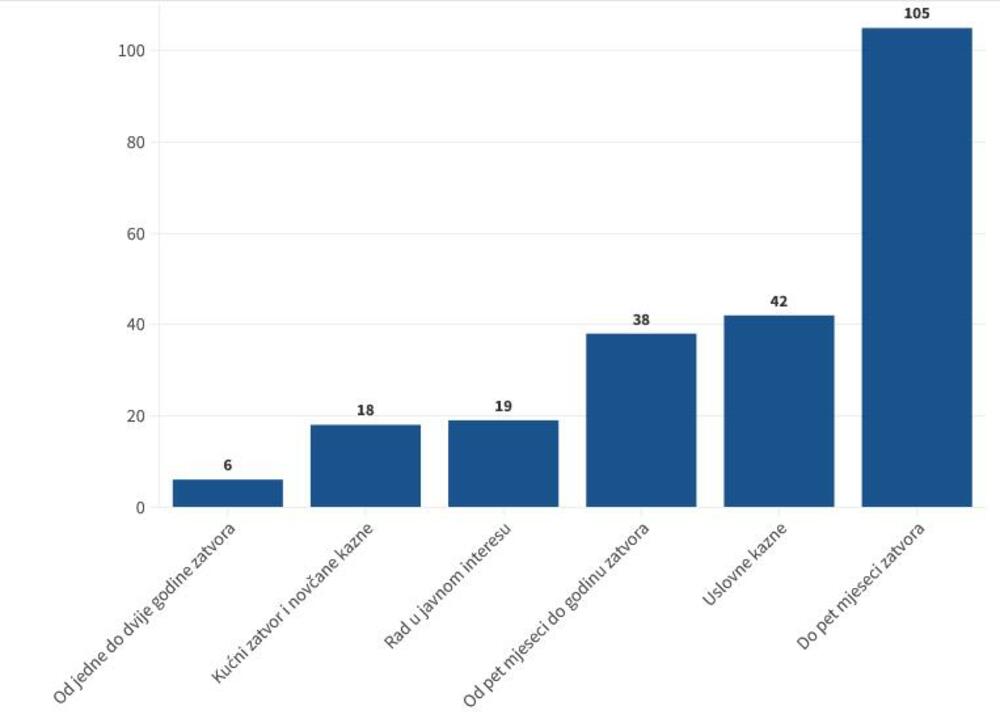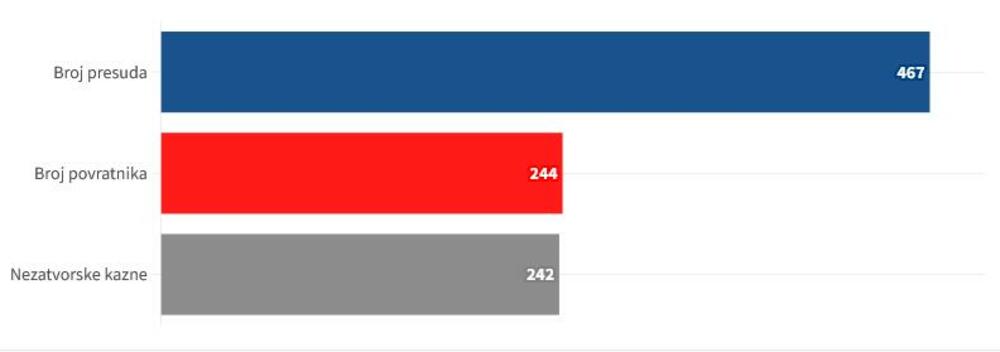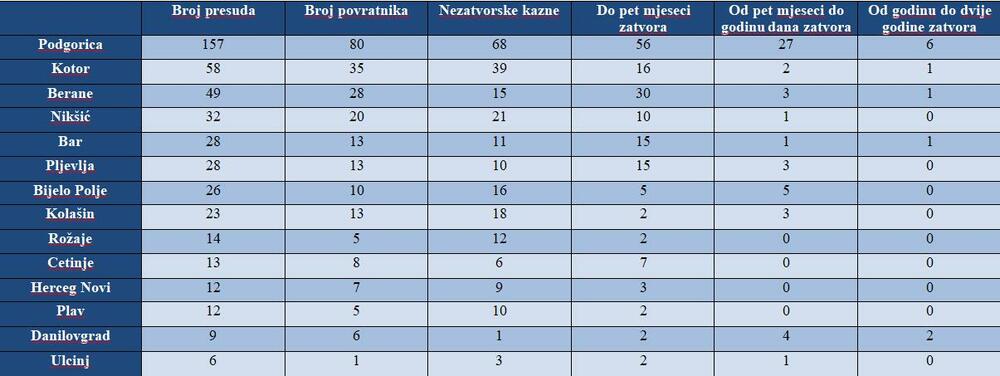A man who previously had a suspended sentence for domestic violence was given ten days of community service in the Basic Court of Kotor, because he beat his wife in front of the child, first with his fists, then threw various objects, and then hit her on the head with a metal bar. , back and shoulders. The stipulated sentence was from three months to three years in prison. In that case, she ruled Momirka Tešić, now a judge of the Constitutional Court.
This is just one of hundreds of verdicts below the legal minimum handed down for domestic violence, from the beginning of 2021 to the end of 2023.
According to the research Center for Investigative Journalism of Montenegro (CIN-CG), more than half of the sentences imposed for domestic violence in Montenegro, in these three years, were suspended sentences and fines, sentences of community service, house arrest or treatment, and more than a third of such sentences were also given to previously convicted persons or those who have already been criminally liable for domestic violence.
Montenegro has a serious problem with violence, and Montenegrin courts, judging by final verdicts, have continued with the practice of ineffective and overly lenient punishments. This kind of punitive policy leads to a worrying number of returnees, but also to the most difficult consequences for the victims.

Courts generally impose prison sentences that are closer to the legal minimum, and the penal policy does not have a sufficiently deterrent character for perpetrators of violence, as indicated by the high degree of recidivism in the commission of these crimes, the director of the Center for Women's Rights (CŽP) confirms for CIN-CG. Maja Raičević.
The police informed CIN-CG that, from the beginning of 2021 to the end of 2023, 1.273 criminal acts related to domestic violence were registered, and in the same period, over 6.000 violations were committed under the Law on Protection from Domestic Violence.
The judiciary does not understand the phenomenon of violence, the seriousness of these crimes is not understood, points out for CIN-CG gender equality expert dr. Kosana Becker and the director of FemPlatz from Serbia.
"The majority of violence is not reported at all, and when it is reported, it is not adequately processed. "It is rare for a woman to go to court for the first violence that happens to her," emphasizes Becker.
More than half of the returnees are among the violent
Among the abusers, in these three years, there were more than half of previously convicted persons or those who had already been charged with misdemeanors for domestic violence. In 467 available judgments analyzed by CIN-CG, 244 cases involved returnees.
Kotor, Nikšić, Berane and Danilovgrad recorded the largest number of returnees.

Rožaje, Plav, Kolašin, Nikšić and Herceg Novi have an even higher number of returnees who did not receive a single day in prison than those who were sentenced to prison terms.
However, in other cities as well, half of those convicted are those who previously committed criminal offenses or were held liable for misdemeanors due to domestic violence.
In the largest court in the country, the Basic Court in Podgorica, multiple returnees who committed even the same criminal and misdemeanor acts of violence were sentenced to work in the public interest. Thus, a man who was previously convicted twice for domestic violence (suspended and fined), for the third time agreed to work in the public interest for 10 days, because he punched his wife in the head. The agreement was accepted by the judge Rade Ćetković.
"The court took into account the mitigating circumstances on the part of the defendant, the fact that the pensioner was in poor financial condition, as well as his demeanor after the crime was expressed through a complete and clear confession that contributed to a faster and more efficient end to the criminal proceedings, and honestly remorse”…

Paradoxically, the same judge, who is also a member of the Judicial Council, handed down a sentence of two years in prison for the violence that, among other things, continued in the courtroom, with a completely opposite explanation of the same circumstances on the defendant's side.
In that verdict, it is explained that "the defendant's family circumstances cannot be considered as a mitigating circumstance, primarily because the defendant was found guilty precisely because of a criminal offense against marriage and the family":
"According to the court's assessment, the defendant's financial condition did not affect any of the defendant's actions, nor can his violent behavior be considered a consequence of his poor financial condition. Also, the court does not give credence to the defendant's expressed remorse, considering that it is a case of insincere and simple verbalization aimed at obtaining the lightest possible sentence".
Such an explanation, which by all standards should be the practice in making such judgments, contradicts almost all other decisions made due to domestic violence in Montenegro. Thus, by default, remorse, the fact that they have children or that they are in poor financial condition are taken as mitigating circumstances.
In the Basic Court of Kotor, those accused of inflicting serious physical injuries and violence against a woman and minor children received three suspended sentences, one house arrest and one 30-day prison sentence. A prison sentence of one to five years was provided for those criminal acts.
In Bijelo Polje, a man who had already been convicted eight times before hit a woman in the head with a glass bottle and was sentenced to work for seven and a half days in the public interest. The law stipulated a prison sentence of three months to three years. He judged Radomir Kljajević. Four suspended sentences, community service and only two prison sentences were imposed for such criminal acts in that court.
Judge of Beran court Ivan Došljak ruled that the violent man, who has been convicted three times before, should serve seven and a half days in the public interest, because, among other things, he shot his wife in the head with a remote control.
Even in Berane, all punishments for this type of crime are below the legal minimum, and the most lenient punishment is for a returnee - work in the public interest.
"She needs someone to beat her up and give her a rest, and then kill her," is the sentence uttered by the defendant, who is sentenced to community service in the Basic Court in Plav.
Four months in prison was the highest sentence for a multiple returnee, who, among other things, attacked his wife and son with an axe. She judged Mirjana Knezevic. Two other returnees received a fine and house arrest for similar violence.
Judge of the Kolašin Basic Court Arsen Popovic decided to send the accused returnee home for physically assaulting his wife, mother and minor brother, threatening to kill them all with a rifle.
In the court in Pljevlja, the returnee of violence (then fined) has now received a suspended prison sentence, because he beat his wife with a bat. She judged Ljiljana Popović.
He is a judge in the Nikšić court Igor Djurickovic sentenced the abuser, who was previously convicted several times, but also punished as a misdemeanor for violence against his ex-wife, to pay 1.400 euros, because he violated the restraining order and this time, among other things, threw a stone at his ex-wife.
Judge of the Rozaj court Mirsad Mujevic he decided to give a conditional sentence to the abuser who beat his wife with a wooden bar, even though she claimed that she had suffered violence for many years and that she was often "all blue". This thug was also previously sentenced to probation, but his sentence was erased.
She is a judge in Herceg Novi Vesna Gazdić decided to give a conditional sentence to a man who was already responsible for misdemeanor violence and violated restraining orders. He attacked his mother and wife again, this time, among other things, by hitting them with a chair, and on the second day he broke down the door with an ax.
In Cetinje, a thug who attacked his pregnant wife while she was holding a child in her arms received a suspended sentence. She judged Marija Cupic.
The returnee was convicted as many as 23 times, of which twice for domestic violence, in the Basic Court in Bar he was sentenced to three months and 22 days in prison. She judged him Snezana Dragojević.
In Ulcinj, a man was sentenced to work for eight days in the public interest for causing serious physical injuries to his wife. A sentence of one to five years in prison was foreseen. The verdict was pronounced by the judge Amir Đokaj.
The court in Danilovgrad is the only court in the country that had almost all prison sentences, and that was quite high compared to other courts in the country. There was only one suspended sentence in these three years.
In cases of previously unconvicted cases, most of the victims stated that they had suffered violence for years, but the court awarded suspended sentences in almost all such cases.
Three-quarters of prison sentences range from a month to several months in prison.
Our country was among the first signatories of the Council of Europe Convention on preventing and combating violence against women and domestic violence (Istanbul Convention). However, even 13 years later, a large number of important recommendations of this Convention have not been followed - the sentences imposed are too light, there is a large number of returnees, and aggravating circumstances are often not taken into account when sentencing.
Women and children are the victims in most cases
About 90 percent of judgments refer to violence by men against women, very often in the presence of children or children are also victims of violence. However, in the analyzed verdicts, the courts take as a mitigating circumstance the fact that the defendants have children, and when violence was committed in front of them or they are also victims of violence, which, according to international standards, as well as domestic regulations, should be an aggravating circumstance .
Raičević reminds that the criminal policy does not depend only on the court's decision, but also on how the procedure is conducted from the moment the violence is reported:
"Thus, more than 80 percent of cases of violence end up in misdemeanors." Our monitoring showed that prosecutors often qualified acts of domestic violence as a lighter offense than the facts in the given case dictated."

It has been noticed, she adds, that the continuity and history of violence, as well as the intersection with other acts such as neglect and abuse of children, are rarely appreciated.
According to the practice of the European Court of Human Rights (ECtHR), it is emphasized that in cases of domestic violence against one parent, to which a child is a witness, continued contact with the violent parent cannot be in the best interest of the child:
"Ensuring contact with an abusive parent can not only have a negative impact on the child, but can also pose a serious safety risk for the victim of the abuser, since it often gives the perpetrator a reason to contact or see the victim and is not in accordance with the issued restraining orders ".
What, Raičević points out, is even more worrying is the fact that the basic courts did not impose any security measure - removal from the apartment, as well as a very small number of measures prohibiting approaching the victim.
The Istanbul Convention also provides for stricter penalties when the victim is a child or when the violence is committed in front of a child, when the violence is committed by two or more people, for extreme violence, the use or threat of a weapon and inflicting serious physical or psychological injuries on the victim.
In these three years, almost all sentences for criminal offenses in which weapons, tools, serious bodily injuries and violence against minors were inflicted were below the legal minimum. For such a criminal offense, a sentence of one to five years in prison was provided.
The Convention also stipulates, as a particularly aggravating circumstance, previous convictions for the same criminal offense, as well as previous misdemeanor punishment.
Becker points out that it is also problematic that the court does not take into account previous misdemeanor responsibility, but considers such defendants unconvicted.
Becker reminds that if we have information that every third woman experiences violence in her life, those judges and prosecutors who decide in these processes cannot be exempted from this.

The convention warns that criminal acts of domestic violence must be punishable by sanctions that deter the commission of criminal acts. The decisions of the competent state authorities must also not depend on whether the victims withdraw their statements and reports.
The Council of Europe's group of experts on combating violence against women and domestic violence (GREVIO) warned Montenegro back in 2018 that punishments must be effective and dissuasive and not harm victims and their children.
"Judges seem to be guided by stereotypical gender roles and respect for the family as the fundamental unit of society. The full range of aggravating circumstances is therefore often not used and sentences are often mitigated," the GREVIO report points out.
It seems that, even after six years, almost nothing has changed.
And in the report of the European Commission (EC), for last year, it is assessed that domestic violence is a serious problem and "the most extreme manifestation of gender inequality in Montenegro." It is noted that, despite a solid legal framework, there is, among other things, a lack of specialization of the judiciary for these topics, and that investigative and judicial practices are very lenient.
"Such a practice is not in accordance with international standards," concludes the EC report.
Light sentences led to renewed violence
A lenient criminal policy leads first of all to recidivism in the perpetration of domestic violence, the executive director of the Women's Alliance points out for CIN-CG Stana Šćepanović.
She reminds that our law allows increasing the penalties for abuse, if someone repeatedly commits the crime:
"The system should react more strongly when it comes to returnees, if there is no such reaction, then that must change".
In the Supreme Court, they confirm that the criminal policy is ineffective in both criminal and misdemeanor cases of domestic violence. Those for CIN-CG assess that the courts refer to extenuating circumstances, more often than to aggravating circumstances, without adhering to international standards.
And Raičević assesses that, contrary to international standards, the courts, for example, use the fact that the defendant is a "father" or "family man", i.e. a "parent", as a mitigating circumstance, and that through their monitoring, they recorded only two examples in which the courts properly appreciated those circumstances.
The Supreme Court adds that in most cases the courts do not provide an adequate explanation:
"It remains unclear how they judged that a suspended sentence is a fairer solution than a prison sentence, or in what sense a warning is an adequate criminal sanction and can serve as a preventive measure that is more effective than a prison sentence".
They also point out that they are aware that lighter punishments lead to a higher rate of return.
The Supreme Court states, however, that in the previous year they observed an increase in prison sentences. According to the CIN-CG analysis, almost all of these prison sentences were for a couple of months, again, they were about returnees, and last year there were many suspended sentences, community service and house arrests for returnees.
From the highest judicial instance in the country, they claim that they recognize the need to tighten the criminal policy, and they hope that the changes to the Criminal Code will strengthen judicial practice.
Recent amendments to the Criminal Code, from December last year, in Montenegro have increased the penalties for the criminal offense of domestic violence, so now the punishment is from six months to 15 years in prison.
At the end of February, the government formed the Operational Team for the fight against domestic violence and violence against women. The MUP told CIN-CG that the goal of that body will be more effective application of regulations, but also the protection of victims of violence. They add that at the first session they will consider, among other things, CIN-CG's questions on judicial practice.
Several of the most drastic cases of violence in recent years that ended in murders, among other things, are a serious alarm that this kind of judicial practice must be changed urgently.

Montenegro does not have official statistics on committed femicides (murder of women).
The CŽP told CIN-CG that, according to their records, 15 femicides were committed in the last five years. Raičević emphasizes that, in three out of four cases of murder of women, which occurred in 2021 and 2022, domestic violence was previously reported.
It's been a while Dalibor Nikolic, who killed his pregnant wife To Zimrit the Nerd, by beating her for hours with a bat and fists, in front of the children, was sentenced to 12 years in prison, because the court concluded that he did not intend to kill her, so it was not a serious murder. Before the tragic event, she reported violence several times.
In the middle of April, the first-instance verdict for the murder is expected Sheila Bakija, which, according to the indictment, Ilir Đokaj, after several months of persecution, shot and wounded her father. Before that, the accused was acquitted in the misdemeanor proceedings for persecuting Bakija.
"Probation sends a message to women that they won't be protected, and it sends a message to men that they can do whatever they want," warns Becker.
Becker concludes that when we succeed in society in raising the level of awareness about violence, that there is nothing private about it, and when we succeed in creating zero tolerance for violence, then judgments will also begin to change.
The higher court considered the sentence of 30 days too severe
Last year, the basic court in Pljevlja decided to depart from the practice of giving suspended sentences for unconvicted persons and decided to punish a man with 30 days in prison for cursing, slapping, and then dragging his wife on the ground. The verdict was pronounced by judge Sanja Aničić.
The higher court in Bijelo Polje, however, changed this sentence to a suspended sentence. Judges were Gorica Đalović, Dragan Mrdak and Dragan Dašić.
"Based on the defendant's appeal, it is pointed out that the specified prison sentence, which was imposed by the first-instance court, was too severe, taking into account all mitigating circumstances on the part of the defendant," the decision of the High Court in Bijelo Polje reads.
In that court, during 2023, several sentences were reduced by double, even though they were about returnees.
Similarly in the region, in Italy the minimum sentence is six times higher
Becker told CIN-CG that court practice in Serbia, as well as in the rest of the region, is similar when we talk about domestic violence.
She points out that in Serbia, by researching domestic violence with the use of firearms, they found data that the punishments are generally mild, at the legal minimum, and that suspended sentences are very common.
She points out that such ridiculous punishments are the "tip of the iceberg" in societies where violence is incredibly widespread, where it is terribly difficult to go through the entire system when reporting violence, and that nothing is on the woman's side.
In Italy, the minimum prison sentence for domestic violence is three years. If the victims of violence are pregnant women, people with disabilities, children or even if they are just witnesses of violence, if a weapon was used, the sentence can be doubled.

Bonus video:




